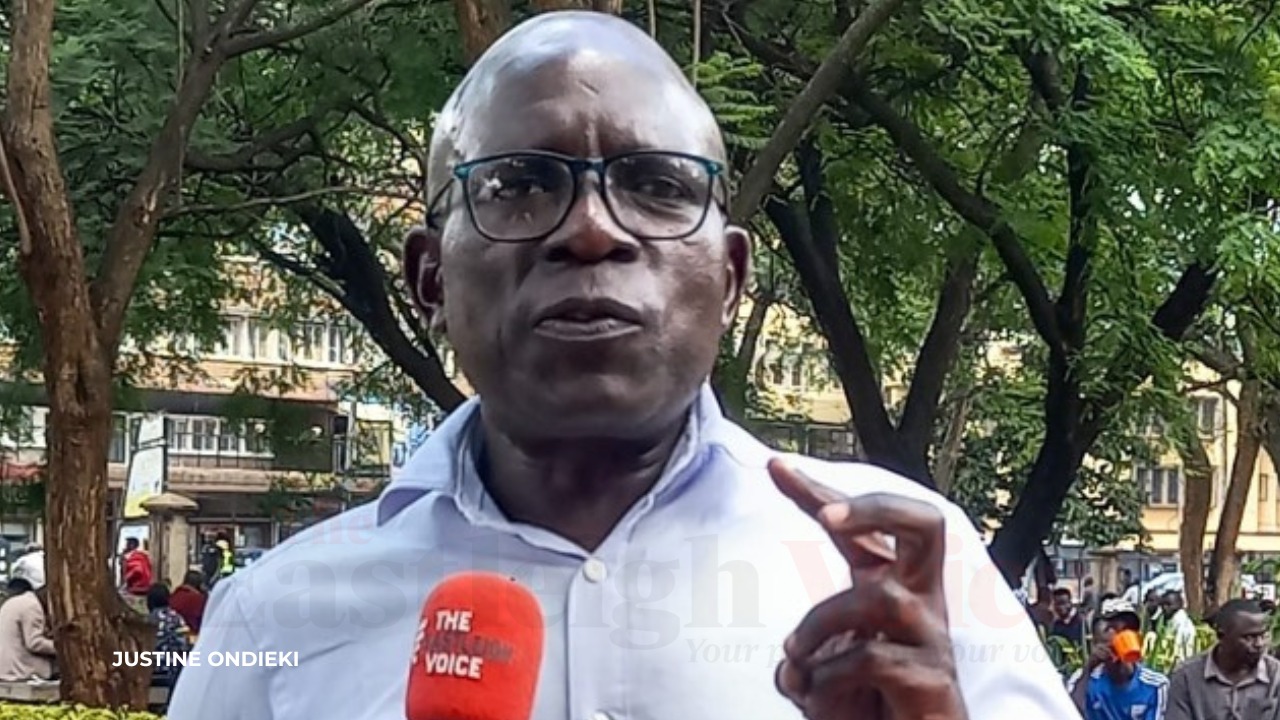Kenya plans to deploy 1,000 police officers to Haiti before Ruto US visit
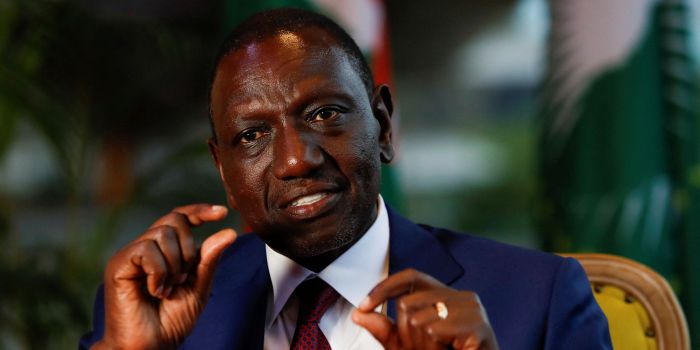
Kenya had initially aimed to enter Haiti as early as January this year, but legal obstacles and a power vacuum delayed the plan B.
Kenya will deploy 1,000 police officers to Haiti for a peace enforcement mission, just 14 days before President William Ruto’s state visit to the United States on May 23, according to sources familiar with the matter.
The multi-national force mission, sanctioned by the UN Security Council, will be spearheaded by the Kenyan police and is aimed at curbing gang violence in Haiti following the installation of a new American-backed transitional government.
More To Read
- Haiti security forces say era of unchecked gang power is over as crackdown intensifies
- Green light for Gang Suppression Force tells Haitians ‘they are not alone’, Security Council hears
- ‘Unprecedented’ number of children on the run in Haiti
- Organisation of American States urges Washington to revive Haiti aid
- UN Security Council approves new "Gang Suppression Force" for Haiti
- Corporal Kennedy Mutuku Nzuve’s body arrives in Kenya from Haiti
However, Kenyans are increasingly getting jittery about the mission. In January a Kenyan court rejected the plan to send police officers to Haiti.
Kenya had initially aimed to enter Haiti in early January, but legal obstacles and a power vacuum delayed the plan.
Despite facing challenges, Nairobi, according to President Ruto, remains committed to sending its forces to the gang-afflicted Caribbean nation to help restore order.
The Miami Herald reported last week that American civilian contractors have begun arriving in Haiti to assist in preparing for the arrival of Kenyan police, according to a top official from the administration of US President Joe Biden.
The Pentagon, already having committed Sh26 billion to support the mission, is tasked with preparing a base for the incoming forces.
According to Todd D. Robinson, the US assistant secretary of state for the Bureau of International Narcotics and Law Enforcement Affairs, an initial deployment of Kenyan police officers is being coordinated to coincide with the arrival of Ruto in Washington later this month.
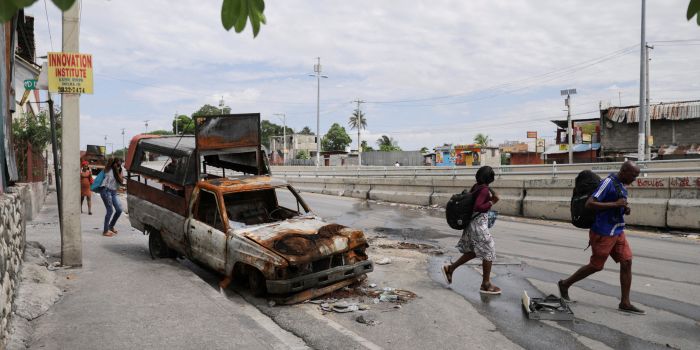 Residents of the Lower Delmas area carry their belongings as they flee their homes due to gang violence, in Port-au-Prince, Haiti May 2, 2024. (Photo: Ralph Tedy Erol/Reuters)
Residents of the Lower Delmas area carry their belongings as they flee their homes due to gang violence, in Port-au-Prince, Haiti May 2, 2024. (Photo: Ralph Tedy Erol/Reuters)
State visit
The White House confirmed that Biden and First Lady Jill Biden will host Ruto and his wife Rachel for a state visit on May 23, commemorating the 60th anniversary of US-Kenya diplomatic relations.
Robinson declined to give an exact date or the number of officers to be deployed as part of the long-awaited multinational security support mission.
Washington is reported to have transported civilian contractors to support the Pentagon to build out the area where the Kenyan support mission will stay while in Haiti.
But Republican lawmakers in Congress have ignored a request by the State Department to release Sh5 billion of the Sh13 billion it has pledged to support the mission.
The American administration has been criticised for not giving lawmakers clear details about the force. UN member states have shown reluctance towards the mission, possibly signalling fatigue within the international community regarding interventions in Haiti.
Despite the substantial funding required for the mission, countries are seemingly turning a blind eye, with the UN deployment fund currently at only Sh2 billion.
“The funds were provided by Canada, France, and the United States,” said Stephane Dujarric, spokesperson for UN Secretary-General Antonio Guterres.
He noted that Kenya, The Bahamas, Bangladesh, Barbados, Benin, Chad, and Jamaica had notified the UN Secretary-General in writing of their intention to provide boots, as requested by the UN Security Council.
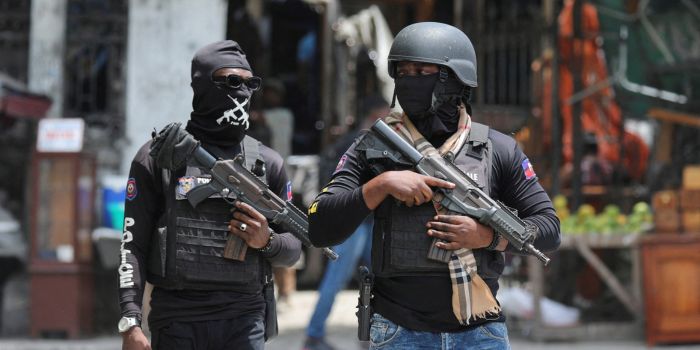 Police officers stand guard in the street, in Port-au-Prince, Haiti May 1, 2024. (Photo: Ralph Tedy Erol/Reuters)
Police officers stand guard in the street, in Port-au-Prince, Haiti May 1, 2024. (Photo: Ralph Tedy Erol/Reuters)
The Haitian police, having been outgunned and outnumbered, have struggled to curb gang violence. In some cases, they’ve been unable to stop invasions of neighbourhoods and the takeover of police stations as the gangs tightened their grip on the capital Port-au-Prince.
The police have succeeded in fighting back attempts to take over the National Palace, the Central Bank, and the international airport, which they’ve protected with help from members of the small Haitian Army.
Frank Elbe, director general of the Haiti National Police, indicated that since the attacks began on February 29, his officers had not only engaged in combat with the gangs but also constructed a buffer zone surrounding the airport.
Elbe’s residence was set on fire by gangs during the chaos. “
We’ve reinforced the security perimeter inside and outside of the airport,” he said.
“The police have carried out a lot of operations that have allowed for improvements in the security at the airport. We’ve also demolished a lot of houses.”
He said the goal is to build the confidence needed for US airlines to resume commercial flights to Haiti, which have been suspended since March 4.
“The second phase of our strategy is to dismantle the gangs and create a space where the government can provide services to neighbourhoods once occupied by gangs,” he said.
That is where the foreign forces, led by Kenya, will help, Elbe said.
“They can help us in the operations that we are going to do to dismantle the gangs.”
While Ruto’s government says Kenya is now ready to deploy to Haiti, some fear the mission will fail as not enough police officers will be sent to fight the gangs.
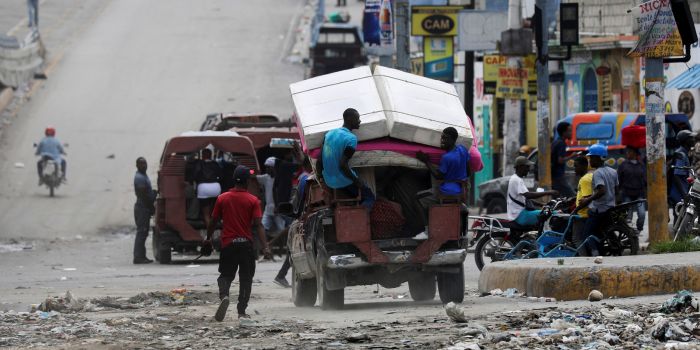 Residents of the Lower Delmas area transport belongings as they flee their homes due to gang violence, in Port-au-Prince, Haiti May 2, 2024. (Photo: Ralph Tedy Erol.Reuters)
Residents of the Lower Delmas area transport belongings as they flee their homes due to gang violence, in Port-au-Prince, Haiti May 2, 2024. (Photo: Ralph Tedy Erol.Reuters)
International obligations
Ruto cites the need to support a “mission for humanity” and ensure Kenya fulfils its international obligations.
He commissioned church leaders to meet with Haitian law enforcement, military representatives, and a gang leader to discuss Kenya’s security mission.
In March, as armed groups escalated their insurgency in the capital Port-au-Prince and plunged Haiti deeper into a historic humanitarian crisis, Kenyan pastors advising President Ruto’s government met for three days at a hotel in Nairobi to pray for the police officers.
In a serene sky-blue conference room within the confines of the Weston Hotel, three Kenyan pastors convened with Haitian and American ministry leaders alongside Kenya’s ‘praying’ First Lady Rachel Ruto.
In 2021, assassins killed former Haitian President Jovenel Moise at his residence in Port-au-Prince. In late February, gang-related violence halted operations at the country’s main airport, leaving several police officers dead and paralysing the capital.
Top Stories Today









